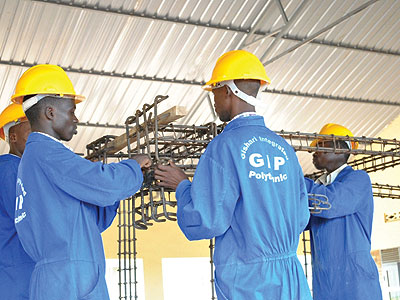Rwanda’s industrial sector could reach the level of developed countries in the coming decade or so if Technical and Vocational Education and Training (TVET) is emphasised and fully supported.


Rwanda’s industrial sector could reach the level of developed countries in the coming decade or so if Technical and Vocational Education and Training (TVET) is emphasised and fully supported.
Mathias Schäfer, the managing director of FingerHaus Limited, a German firm that deals in construction of wood houses, said after concluding a countrywide tour of TVET schools on Saturday.
Schäfer led 11 other German experts who had come to study Rwanda’s educational model and compare it with that of Germany, especially practical skills offered in TVETs.
"We are looking at how we can improve our system by adapting our technical education system to that of Rwanda,” he said.
Schäfer has been supporting Rubengera Technical School in Karongi District in the Western Province for the past two years. His firm sends trainers in carpentry and wood technology to the institute.
He noted that they have been working with the trainers to find out what skills were required in Rwanda so as to send German trainers with required expertise.
"The resources we have here, especially trainers, are impressive. However, the challenge is the students’ lack of hands-on skills,” he noted.
Schäfer also observed that it is important for insitutions to second students to work in established workshops in the country where they can acquire hands-on skills.
Albert Nsengiyumva, the TVET minister, said the German visit showed Germay’s commitment to ensuring that Rwandans develop a pool of skilled personnel to support the country’s growth agenda.
"The German vocational education system is one of the best in the world because they have created a linkage between the private sector and vocational training institutions,” he observed.
"They also have a dual system, where by a student spends some time in school and the other time at a company to get hands-on skills. However, this may be hard to adapt in Rwanda’s education system, but we are considering it.”
The minister said visit by German experts was a return call following his visit to the European industrial powerhouse last October.
Nsengiyumva said they were discussing with foreign companies that win tenders in the various sectors to have a training section for Rwandans to help build the capacities of local professionals.


